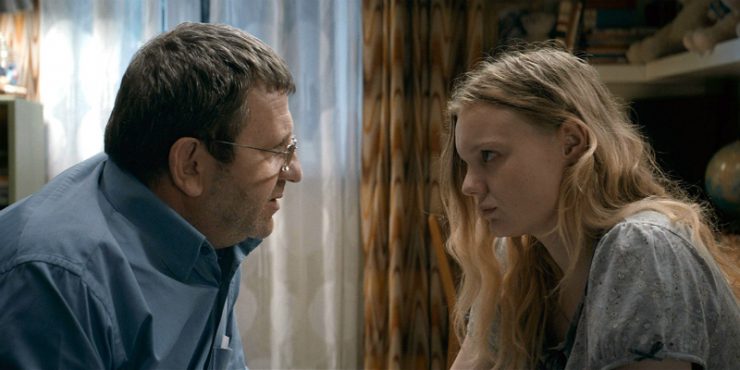The cinematic world of Christian Mungiu is a bleak place indeed. The Romanian filmmaker won the top honor at the Cannes Film Festival – the much-coveted Palme D’Or – in 2007 for his brutal abortion drama 4 Months, 3 Weeks and 2 Days. His latest film, Graduation, is a much less intense film but that isn’t saying much. Graduation is a flood of domestic strife, a film that speaks to the crushing responsibilities of being a spouse, parent and – overall – an adult. Adrian Titieni plays Romeo Aldea, a surgeon living in a crumbling Transylvanian town, where his sole, maniacal focus is on getting his only child, Eliza (Maria-Victoria Dragus), an exemplary grade on her final exam thus allowing her to accept a scholarship to Cambridge University. Romeo used to be an idealistic man who believed he could change Romania for the better, but he has aged into a cynical father whose only hope is to get Eliza to accept a different path than the one he and his wife chose.
Magda (Lia Bugnar), Romeo’s wife and Eliza’s mother, is unwell. She works at a library but spends a lot of her time in bed – Romeo is forced to sleep in the living room. Romeo has been having a year-long affair with a schoolteacher, Sandra (Malina Manovici), who herself has a young son. Romeo’s life is atypical, but stable. Everything becomes unhinged, though, when Eliza is attacked and nearly raped by a stranger on her way to school. Eliza fights off the attacker, but she’s left with a severely sprained wrist which is placed in a cast the day before her first exam. After the shock wears off, Romeo’s paternal concern kicks into another gear as he becomes more obsessed than ever in Eliza’s escape from Romania. He does everything he can to manipulate Eliza’s situation. He undermines school procedure, and demands special treatment. Eliza herself isn’t even confident she’d like to leave for the UK, preferring the company of a boyfriend named Marius (Rares Andrici) who also provides her with motorcycle lessons.
Mungiu’s film has the kind of cascading avalanche of consequence that we’ve seen in the more recent films from Asghar Farhadi. Both directors have an understanding of how our smallest indiscretions have a way of representing our most intense faults and misdeeds. Romeo’s journey throughout Graduation is noble at heart, but dangerous in its execution. Fueled by fear and anger, he begins walking toward illegalities while trying to insure the very best for Eliza. He’s seen for himself how little preparation goes toward shielding yourself against life’s greatest tragedies, but he can’t seem to place that same clarity towards his own actions. He still believes he can control his daughter’s future. Around his mission, his life is falling apart. He strikes relationships with morally skeptical police officers and slippery public servants, meanwhile his marriage fails, his mother’s health rapidly decreases and an anonymous person keeps throwing stones through the windows of his home and car.
As Romeo, Adrian Titeini is incredible. The Romanian actor plays the troubled husband but dedicated father as the perfectly flawed man. Romeo accepts moral compromise, prefers it to an alternative idealistic squalor. He’s intelligent and resourceful, but Titeini smartly plays him as someone who knows that he is stretching himself too thin. The bet he is placing on his own intuition is too large. Romeo’s life is a powder keg, on the verge of absolute calamity stemming from all the threads of his life. Graduation is a slow burning (occasionally tedious) meditation on this man’s moral implication toward his daughter’s future. Mungiu’s screenplay is labyrinthine in its documentation, perfected by Titeini’s performance which brings this tragically imperfect man to life. Graduation is an expert dissection of working class resolve against the oppressive crush of society’s gloomy reality. It’s not a pretty picture.
Produced, Written and Directed by Christian Mungiu










